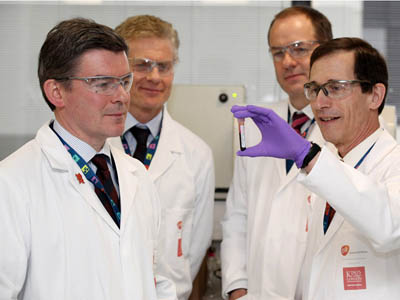London 2012 launches high-tech labs for anti-doping
 0 Comment(s)
0 Comment(s) Print
Print E-mail
China Daily, January 20, 2012
E-mail
China Daily, January 20, 2012
|
|
|
Olympics minister Hugh Robertson (left) listens to Professor David Cowan (right), the Head of Science for London 2012 and Director of King's College London's Drug Control Centre in the anti-doping lab on January 19th, 2012. [Photo: globalnews.ca] |
The London Organizing Committee of the Olympic and Paralympic Games (LOCOG) Thursday unveiled the World Anti-Doping Agency (WADA) accredited anti-doping laboratory which will operate during the London 2012 Games.
LOCOG, laboratory service providers GlaxoSmithKline (GSK) and laboratory operators King's College London, welcomed Hugh Robertson, Minister for Sport and the Olympics for a tour of the facility which is based in Harlow, Essex.
Over 6250 samples will be analyzed throughout the Olympic and Paralympic Games, up to 400 each day which is more than at any other Games.
Up to one in two athletes will be tested at the Olympic Games including every Olympic medallist.
The laboratory, which measures the size of seven tennis courts, will be in operation 24 hours a day, seven days a week.
Over 1,000 LOCOG staff will work within the anti-doping process and a team of more than 150 anti-doping scientists will carry out the testing at the laboratory, led independently by professor David Cowan from the Drug Control Centre at King's College London.
The facility, which has been provided by pharmaceutical company GSK, will be operated by leading anti-doping experts from King's College London and supported by scientists from around the world.
"Today is an important milestone in the countdown to the Games, " said Paul Deighton, London 2012 Chief Executive.
"Working with one of the world's best pharmaceutical companies and one of the country's leading universities we have been able to create a facility to successfully and efficiently process 6,250 tests during the Games which has never been done before."
Minister Hugh Robertson said: "We are doing all we can to ensure that there is no place to hide for drug cheats at London 2012. Our message to any athlete thinking about doping is simple -- we'll catch you."
Professor David Cowan, Director of King's College London's Drug Control Centre said: "These laboratories are the most high-tech labs in the history of the Games, analysing more samples than ever before."
The Anti-Doping process during the London 2012 Games will create a legacy of knowledge about operations and processes. In July 2011, GSK signed an agreement with WADA to share information about its medicines in development, while LOCOG will debrief on all processes.






